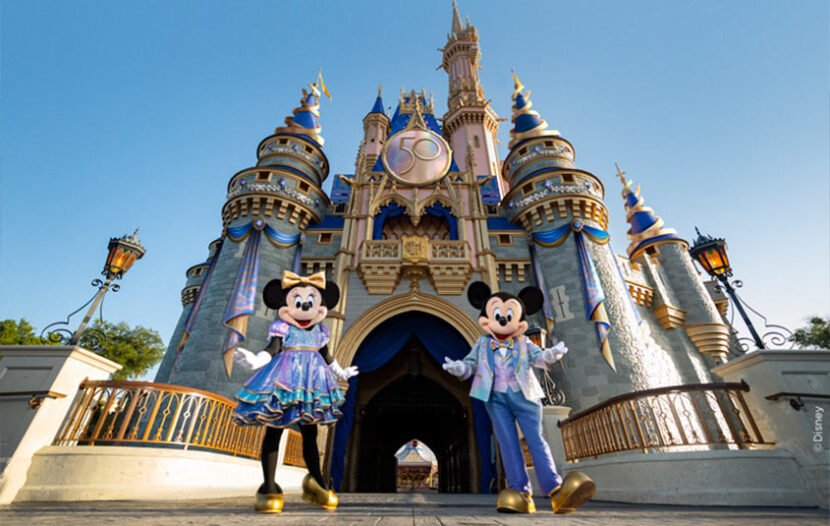ANAHEIM — This past June, Charisma Mangahas — a young woman with Guillain-Barre Syndrome — shared on TikTok that she had been denied disability access service at Disneyland in California. She is one of many disabled individuals who say they are being denied access to this service after Disney parks revised their disability policies over the summer.
Disability access service (DAS) is a service designed for individuals who — due to disability — struggle to wait in a conventional queue. Instead, they are given the option to wait outside of the queue for their turn on a ride or attraction.
While Walt Disney World and Disneyland have said they will continue to offer accommodations for disabled visitors, guests have reported the new policy does not accommodate their complex health needs. This is leaving disabled guests feeling isolated, excluded and discriminated against.
People with disabilities have made their concerns public and have called on the company to reconsider this policy change.
This issue prompts the need for a more critical examination of this policy and similar policies.
Why the change?
The new policy at Disneyland and Walt Disney World now states that DAS is only intended to accommodate guests with autism or similar developmental disabilities. This is a curious limitation, because the policy is supposed to be based on need and not diagnosis.
Disney says a key reason they revised their DAS policy is that its use has risen sharply in recent years. This appears to suggest that many of those making use of the policy are not entitled to do so. However, it is important to note that the number of people living with a disability has been on the rise, particularly post COVID-19.
According to Statistics Canada, people with one or more disabilities impacting daily living increased from 6.2 million people in 2017 to eight million in 2022. The United States Census Bureau reports that around 13 per cent of the U.S. population is living with a disability.
The United Kingdom’s Office for National Statistics states that 79 per cent of those with self-reported long COVID said their symptoms adversely affected their day-to-day activities. Given this, it is not surprising that accommodations like DAS are in higher demand.
Several theme parks have similar policies in place. For example, Universal Studios in Orlando has an accommodation policy that requires guests to submit medical documentation of their accommodation needs to a third-party agency that then approves or denies requests and submits their decision to Universal Parks.
While imperfect, these processes are set up to be objective. Given that we live in a world where ableist discourse has systemic and institutional roots, it is imperative to have fair processes that acknowledge the lived experiences of disabled persons and address their needs.
Making the process of getting help restrictive deters already marginalized people from seeking social supports, especially if it is a daunting and humiliating one. Policies such as these matter because they can impact how the broader population might perceive a particular group and those perceptions have consequences.
I liken this to how the state continues to uphold welfare systems that are punitive and preserve unhelpful stereotypes to deter applicants. Research continues to identify that these policies are harmful yet culturally we are socialized to believe that weeding out a few potential fraudsters is more important than creating equitable conditions for all.
Living with a disability
Living, let alone travelling, as a disabled person can be challenging. Disability law professor Elizabeth Emens identifies the ways disabled people find themselves burdened by the work they have to do to manage their conditions. This is especially cumbersome for those with invisible disabilities who make up the majority of the disabled population. This labour can be intensive, may negatively impact mental health and can be isolating.
Education professor Thomas Hehir posits that ableism makes “the world an unwelcoming and inaccessible place for disabled people.” People with disabilities regularly struggle to live in a world that is not built with them in mind.
Disabled people often find creative ways to adjust despite these challenges, but this comes at a high cost. As a result, many disabled individuals struggle with guilt, shame and the consequences of having to “push through” situations that might be damaging to them. Considering this, finding spaces where disabled people feel safe and included is important.
Further reflection is needed
Disney positions itself as an inclusive brand. However, this policy change risks excluding many who will no longer be able to visit Disney parks.
Disability access services have helped many disabled people manage their conditions. Taking this much needed accommodation away from disabled guests who no longer qualify — without providing a reasonable alternative — lacks foresight.
Theme parks and other businesses that seek to cater to and include people with disabilities must recognize the lived experiences of their guests and reflect on the ways they can build accessibility into experiences.
This article was originally published on The Conversation, an independent and nonprofit source of news, analysis and commentary from academic experts.
